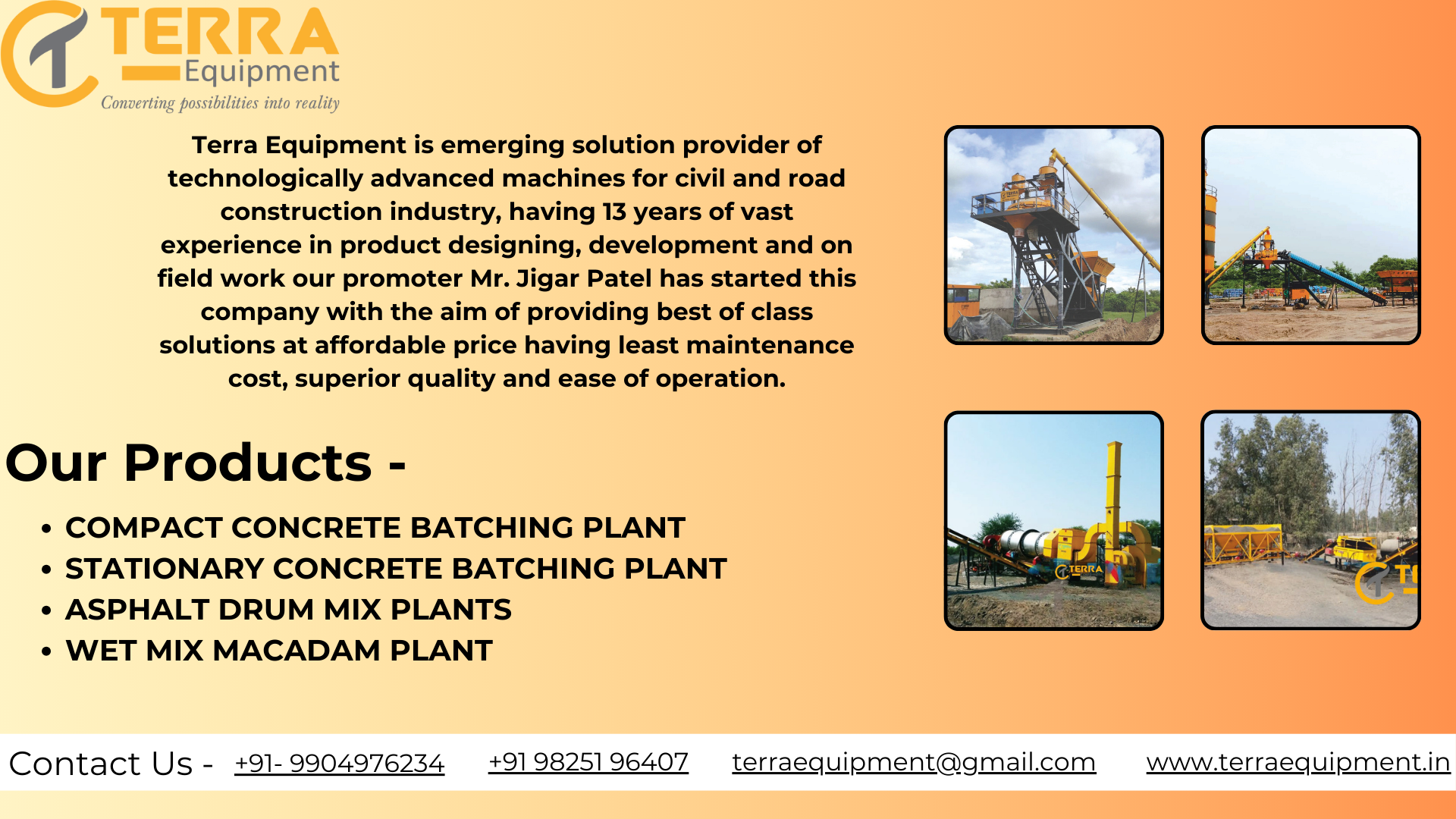Introduction — Top Batching Plant Manufacturers in India
Looking for the top batching plant manufacturers in India? This guide compares what truly matters on site—accurate weigh-dosing, mixer performance, automation, safety, and lifecycle support—so you shortlist partners with confidence. India’s leading brands supply stationary, mobile, and compact plants with PLC/HMI controls, moisture compensation, and proven twin-shaft or planetary mixers for uniform concrete from M20 to M60. Robust frames, sealed conveyors, and dust control keep sites clean and compliant, while modular skids speed setup and relocation. If you need sizing, calibration, commissioning, or operator training, terraequipment provides end-to-end support to help you ramp fast and maintain consistent, on-spec output.
Working Principle & Process Flow — Batching Plant
A modern batching plant weigh-doses each ingredient per approved mix design and then mixes at controlled speed/time. The PLC/HMI coordinates aggregate gates, cement screws, and water/admixture pumps, while moisture probes auto-correct free water in aggregates to hit target slump without over-cementing. Events are logged for QA and traceability; recipe management prevents manual errors and ensures repeatable quality across shifts. Explore automation options with terraequipment to boost throughput and reduce waste.
Applications & Benefits — Batching Plant
- Ready-mix supply for commercial buildings, housing, and industrial sheds.
- Roads & highways: DLC/PQC for rigid pavements with slip-form pavers.
- Precast & prestressed yards: girders, sleepers, blocks, hollow-core.
- Bridges, metro, and airports requiring high early-strength, pumpable mixes.
- Infrastructure upgrades in tier-2/3 cities using compact/mobile plants.
- Accurate dosing + moisture compensation → consistent slump/strength; lower cement cost.
- Automated sequencing with fast cycles → higher hourly output and fewer bottlenecks.
- Rugged frames, sealed conveyors, and dust control → cleaner sites, less downtime.
- Full batch logs and remote diagnostics → strong QA, audit readiness, and traceability.
Key Features — Batching Plant
- Load-cell weigh batching with PLC/HMI recipe control for repeatable accuracy.
- Inline moisture probes with auto-correction to hit target slump and reduce cement overuse.
- Twin-shaft/planetary mixers optimized for fast homogeneity and harsh/colored mixes.
- Modular stationary, mobile, and compact layouts with bolt-on silos & conveyors for quick installs.
- Safety interlocks, sealed conveyors, dust collection, and remote support for low maintenance.
Top Manufacturers & Suppliers in India
To shortlist the top batching plant manufacturers in India, prioritize precise dosing hardware, proven mixers, clean site operation, documentation, and after-sales responsiveness. terraequipment offers load-cell dosing, twin-shaft/planetary mixers, moisture compensation, and PLC/HMI control with full batch reporting. Modular stationary, mobile, and compact options speed commissioning and relocation. Every supply includes GA drawings, calibration support, and operator training—plus standardized spares and pan-India service—to keep uptime high and quality consistent.
Maintenance & Safety Tips — Batching Plant
Monthly / Quarterly
- Change gearbox oil per OEM schedule; grease bearings; inspect mixer liners/paddles for wear and clearances.
- Validate moisture probe, flow meters, and load cells using test weights/volumes; update certificates.
- Inspect silo safety: PRVs, over-fill alarms, fill line gaskets, camlocks, and earthing continuity.
Operating Best Practices
- Maintain housekeeping: avoid cement build-up on weigh hoppers and mixer lips; clean at shift end.
- Don’t bypass interlocks; run approved recipes and ramp sequences—avoid manual shortcuts.
- Ensure safe access: anti-slip platforms, guard chains at discharge, and adequate lighting.
FAQs — Batching Plant
Q1 How do I shortlist the top batching plant manufacturers in India?
Q2 Twin-shaft vs planetary mixer—what’s better for Indian projects?
Q3 Why is moisture compensation important in India’s climate?
Q4 What installation/commissioning timelines should I plan for?
Q5 What documents should a top manufacturer provide?
Get in Touch
Terra Euipment • We’re here to help
Relevant Tags
- Top batching plant manufacturers in India
- Concrete batching plant manufacturers in India
- Top 10 concrete batching plant manufacturers
- Batching plant company list
- Batching plant manufacturers in Gujarat
- Concrete batching plant company names
- mobile concrete batching plant
- stationary concrete batching plant
- rmc batching plant manufacturer india
- concrete batching plant price in india
- ready mix concrete plant suppliers
- precast batching plant manufacturer

